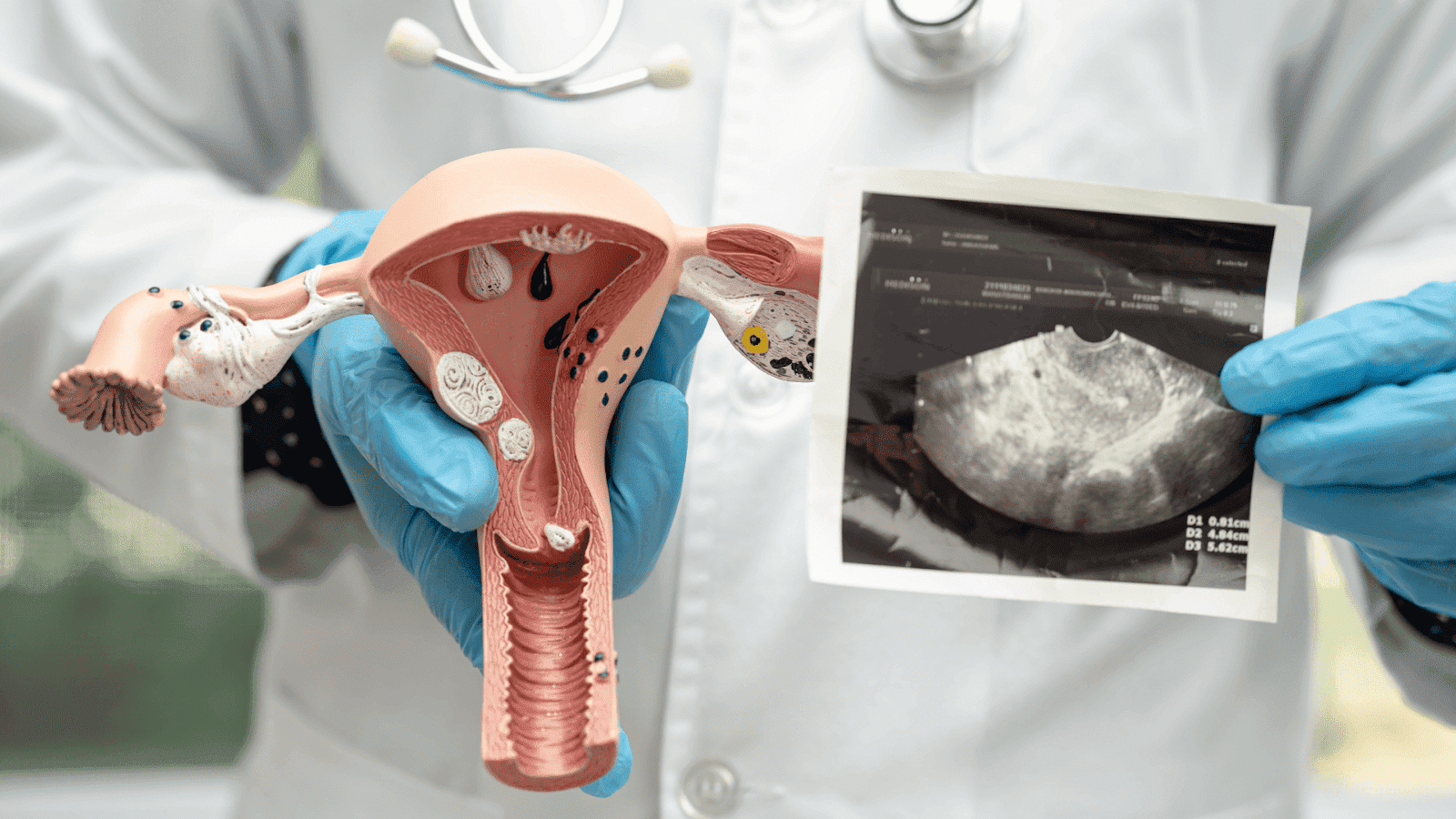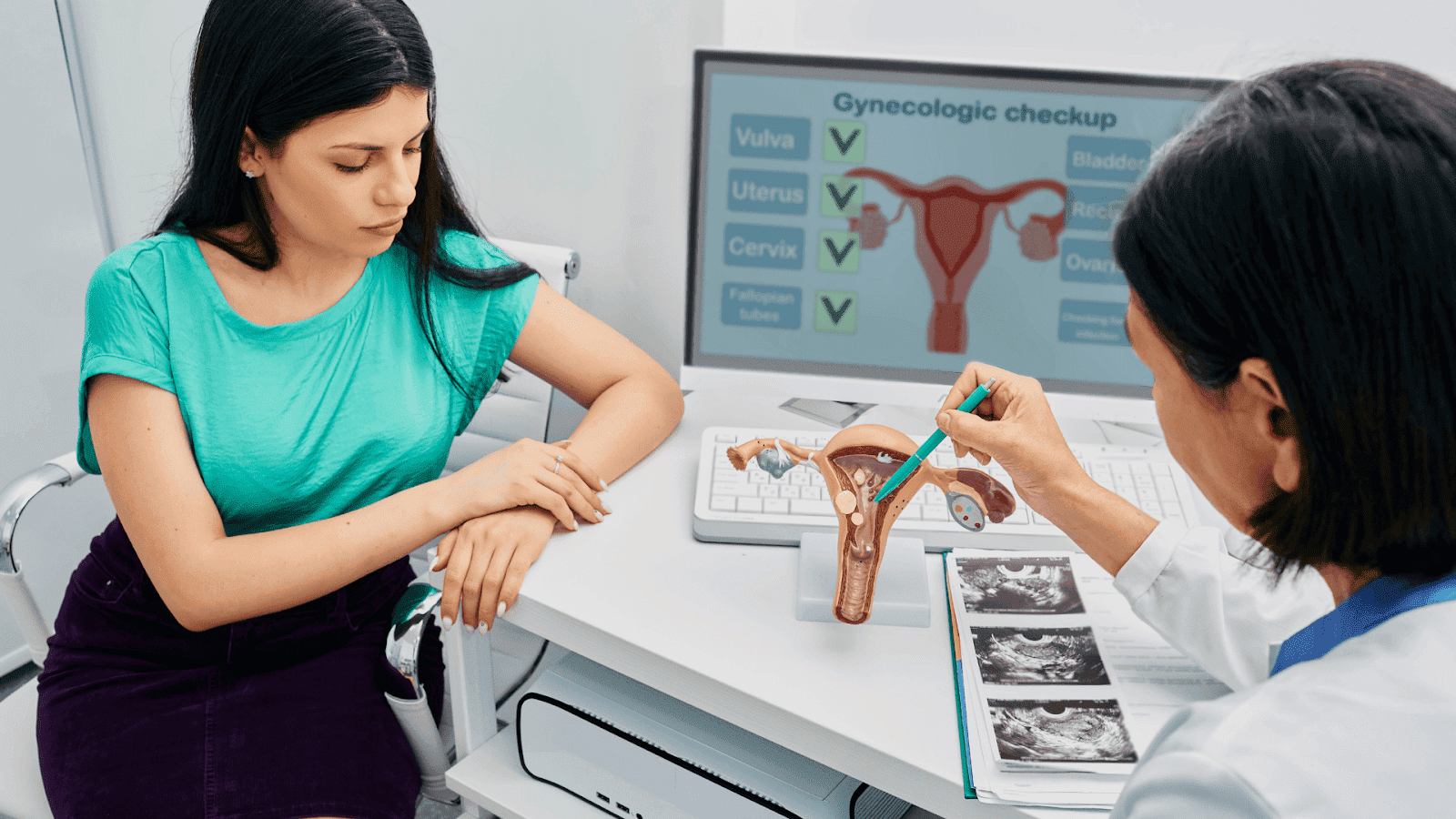Polycystic Ovary Syndrome (PCOS) is a common hormonal disorder affecting millions of women worldwide. Despite its prevalence, many women remain unaware of the condition or mistake its symptoms for other health issues. Early recognition and diagnosis are crucial for managing PCOS effectively and preventing long-term complications such as infertility, diabetes, and heart disease.
In this article, you’ll learn how to quickly identify potential signs of PCOS, understand its symptoms, and discover how modern telehealth services like Doctronic.ai can help you get a fast, reliable assessment from the comfort of your home.
 What Is PCOS and Why Should You Care?
What Is PCOS and Why Should You Care?
PCOS is a hormonal imbalance that affects women of reproductive age. It is characterized by irregular menstrual cycles, excessive androgen levels (male hormones), and the presence of cysts on the ovaries. The exact cause of PCOS is unknown, but it is believed to involve a combination of genetic and environmental factors.
According to the Centers for Disease Control and Prevention (CDC), PCOS affects approximately 6% to 12% of women in the United States, making it one of the most common endocrine disorders. Despite this, many women go undiagnosed for years due to the variability of symptoms and lack of awareness.
Understanding PCOS is important because it impacts not only reproductive health but also metabolic and psychological well-being. Early diagnosis can lead to better management strategies, reducing risks of diabetes, cardiovascular disease, and mental health issues like anxiety and depression.
Women with PCOS often experience a range of symptoms that can vary widely from one individual to another. Common manifestations include weight gain, acne, and excessive hair growth, known as hirsutism, which can significantly affect self-esteem and body image. Additionally, many women with PCOS struggle with infertility, as the hormonal imbalances can disrupt ovulation. This can lead to feelings of frustration and helplessness, emphasizing the need for awareness and education about the condition.
Furthermore, the long-term implications of PCOS extend beyond reproductive challenges. Research indicates that women with PCOS are at a higher risk of developing insulin resistance, which can lead to type 2 diabetes. Lifestyle modifications, such as adopting a balanced diet and engaging in regular physical activity, can be beneficial not only for managing PCOS symptoms but also for improving overall health outcomes. Support from healthcare providers and peer groups can also play a crucial role in helping women navigate the complexities of this condition, fostering a sense of community and shared experience.
Common Symptoms of PCOS: What to Look For
PCOS presents with a variety of symptoms that can differ widely from person to person. Recognizing these symptoms early can prompt timely medical evaluation. Here are the most common signs to watch for:
Irregular or Absent Menstrual Periods
One of the hallmark signs of PCOS is irregular menstrual cycles. Women may experience fewer than eight periods a year, or their cycles may be longer than 35 days. Some may stop having periods altogether (amenorrhea). This irregularity is due to hormonal imbalances that prevent regular ovulation. The unpredictability of menstrual cycles can also lead to anxiety and stress, as it complicates family planning and can impact overall quality of life.
Excess Androgen Levels
Elevated levels of male hormones can cause physical changes such as excessive facial and body hair growth (hirsutism), severe acne, and male-pattern baldness. These symptoms often cause distress and can be a visible indicator of PCOS. In addition to the physical manifestations, the psychological impact of these symptoms can be significant, leading to issues such as low self-esteem and body image concerns. Many women seek treatments ranging from hormonal therapies to cosmetic procedures to manage these symptoms effectively.
Polycystic Ovaries
Ultrasound imaging may reveal enlarged ovaries with multiple small cysts, which are immature follicles. However, not all women with PCOS have cysts, and cysts alone do not confirm the diagnosis. It's important to note that the presence of these cysts is just one aspect of a multifaceted condition. The size and number of cysts can vary, and some women may have normal-appearing ovaries but still experience the hormonal imbalances characteristic of PCOS.
Weight Gain and Difficulty Losing Weight
Many women with PCOS struggle with weight gain or obesity, especially around the abdomen. Insulin resistance, a common feature of PCOS, can make weight management particularly challenging. This resistance can lead to increased hunger and cravings, making it difficult to maintain a healthy diet. Moreover, even small amounts of weight loss can significantly improve symptoms and restore hormonal balance, highlighting the importance of a tailored approach to diet and exercise for those affected.
Other Symptoms
Additional symptoms may include fatigue, mood changes, darkening of the skin (especially around the neck or underarms), and infertility or difficulty conceiving. The emotional toll of PCOS can be profound, as many women face not only the physical challenges but also the societal pressures related to fertility and body image. Support groups and counseling can be beneficial for those navigating the complexities of living with PCOS, providing a sense of community and shared experience.
Quickly Checking Your Symptoms: What You Can Do Today
If you suspect you might have PCOS based on the symptoms outlined above, taking prompt action is essential. Here’s a simple approach to quickly check your symptoms and decide on the next steps:
Step 1: Track Your Menstrual Cycle
Keep a detailed record of your periods for at least two to three months. Note the length of your cycle, flow intensity, and any missed periods. This information is vital for healthcare providers to assess your hormonal health. Additionally, consider tracking any accompanying symptoms such as cramps, mood changes, or fatigue, as these can provide further insights into your overall reproductive health. Utilizing apps designed for menstrual tracking can simplify this process and help you visualize patterns over time.
Step 2: Note Any Physical Changes
Observe and document any new or worsening symptoms such as increased hair growth, acne, or changes in weight. Take photos if necessary to track progression over time. It may also be beneficial to monitor your skin's condition, as PCOS can lead to various dermatological issues. Keeping an eye on your energy levels and sleep patterns can also be important, as hormonal imbalances often impact these areas significantly.
Step 3: Use Online Symptom Checkers with Caution
While online tools can provide preliminary insights, they often lack the nuance of professional medical evaluations. Instead, consider using advanced AI-powered platforms like Doctronic.ai, which synthesize the latest peer-reviewed medical research to offer personalized and accurate assessments. Remember that these tools should complement, not replace, professional medical advice. Engaging with reputable health forums or communities can also provide support and shared experiences from others navigating similar health concerns.
Step 4: Schedule a Telehealth Consultation
Accessing a healthcare professional quickly is easier than ever with telehealth services. Doctronic offers affordable, convenient video visits with licensed doctors 24/7 across all 50 states. This allows you to discuss your symptoms, receive a preliminary diagnosis, and get guidance on necessary lab tests or referrals, all without leaving your home. Moreover, telehealth consultations can often lead to quicker follow-ups and adjustments to treatment plans, ensuring that you receive timely care tailored to your evolving needs. Be prepared to discuss your findings from the previous steps to facilitate a productive conversation with your healthcare provider.
Why Choose AI-Powered Telehealth for PCOS Screening?
Traditional healthcare routes can be time-consuming and costly, especially when trying to get a specialist appointment. AI-powered telehealth services are transforming this experience by offering fast, reliable, and personalized care.
Doctronic.ai stands out as a leader in this space. It offers free AI doctor visits that provide comprehensive answers based on the latest medical research. Unlike generic symptom checkers, Doctronic’s AI remembers your medical history and tailors its advice accordingly, making it a smart first step in managing PCOS symptoms.
Additionally, if you need further evaluation, Doctronic provides affordable telehealth video visits with real doctors anytime, anywhere. This seamless integration of AI and human expertise ensures you get the best care without delays.
 What to Expect During a PCOS Diagnosis
What to Expect During a PCOS Diagnosis
Diagnosing PCOS involves a combination of clinical evaluation, lab tests, and imaging studies. Here’s what typically happens during the process:
Medical History and Physical Exam
Your healthcare provider will ask about your menstrual cycle, weight changes, hair growth, and family history of PCOS or related conditions. A physical exam may include checking for signs of excess hair growth, acne, and high blood pressure.
Blood Tests
Blood work is essential to measure hormone levels, including androgens, insulin, and glucose. These tests help confirm the diagnosis and assess associated risks like insulin resistance.
Ultrasound Imaging
An ultrasound of the ovaries can detect cysts and assess ovarian size. However, the presence of cysts alone is not sufficient for diagnosis.
Diagnostic Criteria
PCOS is diagnosed when at least two of the following three criteria are met: irregular ovulation, elevated androgen levels, and polycystic ovaries on ultrasound. Other conditions that mimic PCOS must be ruled out.
Managing PCOS: Lifestyle and Medical Options
While there is no cure for PCOS, symptoms can be effectively managed through a combination of lifestyle changes and medical treatments.
Healthy Diet and Exercise
Maintaining a balanced diet rich in whole foods and regular physical activity can improve insulin sensitivity and help regulate menstrual cycles. Weight loss, even modest amounts, can significantly reduce symptoms.
Medications
Your doctor may prescribe hormonal contraceptives to regulate periods, anti-androgen medications to reduce excess hair growth, or metformin to improve insulin resistance.
Fertility Treatments
For women trying to conceive, fertility medications or assisted reproductive technologies may be necessary.
Regular Monitoring
Ongoing medical follow-up is important to monitor symptoms, manage risks, and adjust treatment plans as needed.
When to Seek Immediate Medical Attention
While PCOS is a chronic condition, certain symptoms require urgent care. Contact a healthcare professional immediately if you experience:
Severe abdominal pain
Sudden weight gain or swelling
Signs of diabetes, such as excessive thirst or frequent urination
Severe mood changes or thoughts of self-harm
For non-emergency concerns, telehealth services like Doctronic offer a quick and accessible way to get professional advice anytime.
Take Control of Your Health Today
PCOS can feel overwhelming, but early recognition and proactive management make a significant difference. If you suspect you have PCOS, start by tracking your symptoms and consulting with a healthcare provider. Leveraging innovative tools like Doctronic.ai can speed up this process, providing you with fast, accurate, and personalized medical guidance without the wait.
Remember, your health is worth prioritizing. With the right support and information, you can manage PCOS effectively and maintain a vibrant, healthy life.
Ready to Address Your PCOS Concerns? Doctronic Is Here to Help
If you're worried about PCOS and looking for a quick, accurate, and personalized assessment, Doctronic is your go-to solution. Our AI-powered platform offers free doctor visits and leverages the most current peer-reviewed medical research to provide you with quality care in seconds. Experience the most modern and personal healthcare available, with the convenience of 24/7 telehealth video visits with our doctors in all 50 states. Don't wait any longer for the answers you need. Skip the line. Talk to an AI Doctor Now, for free.



 What Is PCOS and Why Should You Care?
What Is PCOS and Why Should You Care? What to Expect During a PCOS Diagnosis
What to Expect During a PCOS Diagnosis